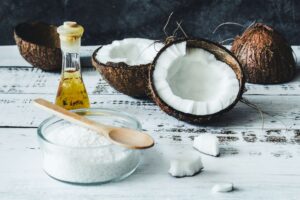The Lip Balm Revolution

In the pursuit of soft, supple lips, nature often provides the most potent remedies. Among these, coconut oil stands out as a hero, offering a natural solution to the common woe of chapped lips. As we delve into the healing power of coconut oil, we unravel the secrets of this tropical elixir, exploring its nourishing properties, practical application, and the transformative journey it embarks upon to rescue and revive chapped lips.
Chapped lips, a ubiquitous concern, are not merely a cosmetic inconvenience. They can be indicative of various factors, including dehydration, harsh weather conditions, or a lack of essential nutrients. The delicate skin on our lips is particularly susceptible to dryness and cracking, making it essential to address the root causes while providing immediate relief.
The Nutrient-Rich Elixir
Coconut oil, derived from the kernels of coconuts, has long been celebrated for its multifaceted benefits. Rich in fatty acids, vitamins, and antioxidants, coconut oil serves as a powerhouse of nutrients that contribute to skin health. The medium-chain fatty acids, such as lauric acid, exhibit antimicrobial and anti-inflammatory properties, making coconut oil an ideal candidate for healing chapped lips.
Application of Coconut Oil for Chapped Lips
The beauty of coconut oil lies in its simplicity and versatility. The application process is straightforward, requiring nothing more than a jar of high-quality, unrefined coconut oil.
- Pure Coconut Oil Application: The most straightforward method involves applying a small amount of pure, unrefined coconut oil directly to the lips. Using clean fingertips, gently massage the oil onto the lips, allowing it to be absorbed. This simple ritual can be repeated several times throughout the day, especially in harsh weather conditions or when the lips feel particularly parched.
- Coconut Oil Lip Balm: For a portable and convenient option, consider creating a homemade coconut oil lip balm. Mix a tablespoon of coconut oil with a teaspoon of beeswax and a few drops of your favorite essential oil, such as lavender or peppermint, for added fragrance. Melt the ingredients together, pour the mixture into a small container, and allow it to solidify. This DIY lip balm not only harnesses the moisturizing power of coconut oil but also provides a delightful sensory experience.
- Coconut Oil and Sugar Scrub: Exfoliation is a key aspect of lip care, particularly for chapped lips. A simple coconut oil and sugar scrub can work wonders. Mix equal parts coconut oil and sugar to create a gentle yet effective lip scrub. Gently massage the scrub onto your lips in circular motions, allowing the sugar to slough away dead skin cells while the coconut oil nourishes and moisturizes.
The Healing Journey
Coconut oil, when applied to chapped lips, initiates a transformative healing journey. Here’s how:
- Immediate Hydration: The emollient nature of coconut oil ensures rapid hydration. It penetrates the skin, infusing it with moisture and creating a protective barrier that helps prevent further moisture loss. This instant surge of hydration is particularly beneficial for alleviating the discomfort of dry, chapped lips.
- Nourishment from Within: Beyond surface hydration, coconut oil delivers a spectrum of nutrients directly to the delicate skin of the lips. The fatty acids, including lauric acid, exhibit anti-inflammatory properties, soothing irritated skin and kickstarting the healing process.
- Antimicrobial Shield: Lauric acid, a prominent component of coconut oil, boasts antimicrobial properties that help protect the lips from bacterial or fungal infections. This is especially crucial for chapped lips, as cracks and fissures can create entry points for unwanted pathogens.
- Gentle Exfoliation: The application of coconut oil, whether in its pure form or as part of a scrub, facilitates gentle exfoliation. This process removes dead skin cells, allowing fresh, healthy skin to emerge. Regular exfoliation helps maintain the smooth texture of the lips and enhances the effectiveness of the healing properties of coconut oil.
Choosing the Right Coconut Oil
For optimal results, it’s crucial to choose the right type of coconut oil. Opt for unrefined, virgin coconut oil, as it retains its natural nutrients and aroma. Cold-pressed varieties further preserve the oil’s integrity by avoiding high temperatures during extraction. Quality matters, so invest in a reputable brand that prioritizes the purity and sustainability of their coconut oil.

Incorporating Coconut Oil into Daily Lip Care
Making coconut oil a staple in your daily lip care routine can be a transformative and holistic approach to maintaining soft, healthy lips. Here’s a suggested routine:
- Morning Boost: Start your day by applying a thin layer of coconut oil to your lips. This not only sets the stage for hydration but also provides a natural shine, eliminating the need for synthetic lip gloss.
- Midday Pick-Me-Up: If you find your lips yearning for a moisture boost during the day, a quick application of coconut oil can provide instant relief. Keep a small jar or container in your bag for easy access.
- Evening Renewal: Before bedtime, indulge in a slightly thicker application of coconut oil. This overnight treatment allows the oil to work its magic while you sleep, promoting deep hydration and repair.
In the realm of natural remedies, coconut oil for chapped lips stands out as a reliable and holistic solution. Its healing properties, coupled with its accessibility and versatility, make it a timeless choice for those seeking to nurture and revive their lips. Embrace the tropical elixir, unlock the secrets of coconut oil’s healing journey, and let your lips revel in the lush embrace of nature’s remedy. In the symphony of lip care, coconut oil plays a harmonious tune, soothing chapped lips and paving the way for a journey towards enduring softness and vitality.

